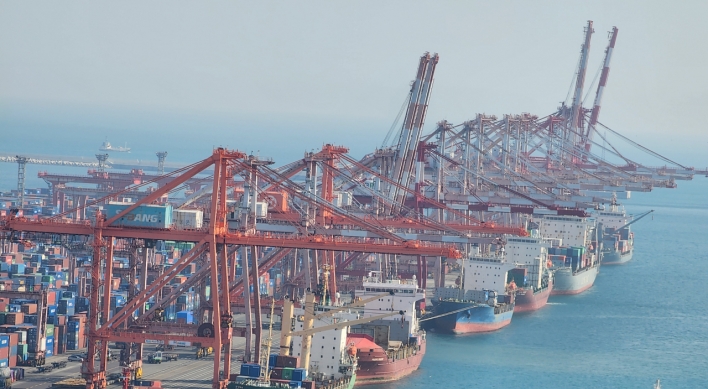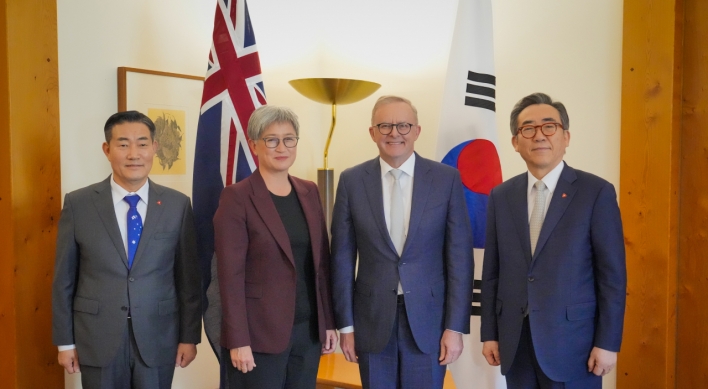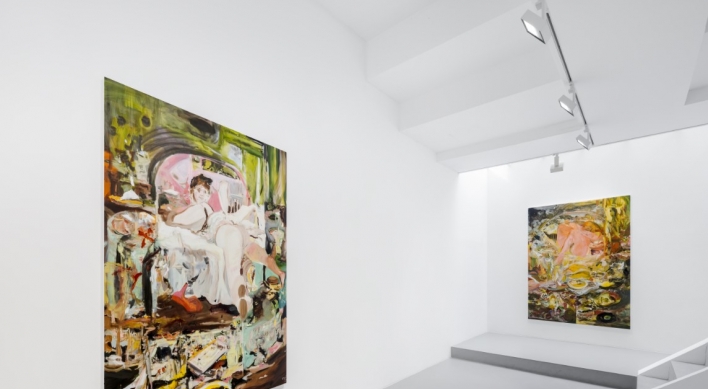The prospects of economic democratization measures being processed at the National Assembly are becoming increasingly unclear due to growing opposition from businesses and rising calls for caution from the ruling Saenuri Party.
“Society has attached the term democratization to just anything, and now very irresponsible populist claims are running rampant,” Rep. Lee Hahn-koo, Saenuri Party floor leader, said on Monday when outstanding issues regarding economic democratization were put up for discussion at the National Policy Committee.
He went on to say that politicians must keep in mind that populist policies could prove harmful to the country.
“It is now necessary for the National Assembly to take a more responsible position in handling various issues.”
The process of revising regulations and introducing tougher measures against anticompetitive activities has effectively been on hold since April 10 when the revised Fair Transactions in Subcontracting Act was approved by the parliamentary National Policy Committee on April 10. Although the revision has passed the first hurdle toward implementation, it has since been sitting at the Legislation and Judiciary Committee without further progress.
Other major regulatory changes including the plan to revise the Monopoly Regulation and Fair Trade Act face a tougher passage, with disagreement between ruling and opposition parties preventing them from progressing beyond the level of the National Policy Committee.
One of the main sticking points in the discussions over the Monopoly Regulation and Fair Trade Act is the proposal to change the standard for classifying in-house transactions as anticompetitive.
Under the proposed revision, the clause regarding illegal in-house trading will be changed from “substantially favorable terms” to “considerably favorable terms.” The proposed change has met fierce criticism from businesses with critics saying that it could expose all in-house transactions to potential legal action.
Unlike the fair trade act, however, the National Policy Committee approved the proposed revision to the Act on Reporting and Use of Certain Financial Transaction Information on Monday. The change will allow the Financial Intelligence Unit to provide information regarding transactions involving suspicious circumstances or large amounts of cash to the National Tax Service.
The change is an essential part of the Park Geun-hye administration’s plans to place the underground economy under tight control as part of the measures to increase welfare without raising taxes.
As the discussions over economic democratization measures continued, the parliamentary committees began reviewing the government’s budget supplementation plan.
If approved by the concerned 11 of 16 parliamentary committees, the budget supplementation plans will be reviewed by the Special Committee on Budget and Accounts. The parties plan to put the issue to a vote at the plenary session on May 3 or May 6, but the outcome remains unclear with the Saenuri Party and the main opposition Democratic United Party continuing to wrangle over the details.
The DUP has called for curtailing tax benefits for high income groups to compensate for the drop in tax revenues, while the Saenuri Party says any tax raises would further constrict the economy.
While the parties struggle over economic democratization and budget supplementation, the
National Assembly is scheduled to hold its first series of interpellation sessions with the new government on Thursday.
The two-day sessions will cover the areas of political affairs, foreign policy, unification policy and national security.
Friday’s sessions will cover policies related to the economy, education, social affairs and cultural affairs.
By Choi He-suk (cheesuk@heraldcorp.com)
“Society has attached the term democratization to just anything, and now very irresponsible populist claims are running rampant,” Rep. Lee Hahn-koo, Saenuri Party floor leader, said on Monday when outstanding issues regarding economic democratization were put up for discussion at the National Policy Committee.
He went on to say that politicians must keep in mind that populist policies could prove harmful to the country.
“It is now necessary for the National Assembly to take a more responsible position in handling various issues.”
The process of revising regulations and introducing tougher measures against anticompetitive activities has effectively been on hold since April 10 when the revised Fair Transactions in Subcontracting Act was approved by the parliamentary National Policy Committee on April 10. Although the revision has passed the first hurdle toward implementation, it has since been sitting at the Legislation and Judiciary Committee without further progress.
Other major regulatory changes including the plan to revise the Monopoly Regulation and Fair Trade Act face a tougher passage, with disagreement between ruling and opposition parties preventing them from progressing beyond the level of the National Policy Committee.
One of the main sticking points in the discussions over the Monopoly Regulation and Fair Trade Act is the proposal to change the standard for classifying in-house transactions as anticompetitive.
Under the proposed revision, the clause regarding illegal in-house trading will be changed from “substantially favorable terms” to “considerably favorable terms.” The proposed change has met fierce criticism from businesses with critics saying that it could expose all in-house transactions to potential legal action.
Unlike the fair trade act, however, the National Policy Committee approved the proposed revision to the Act on Reporting and Use of Certain Financial Transaction Information on Monday. The change will allow the Financial Intelligence Unit to provide information regarding transactions involving suspicious circumstances or large amounts of cash to the National Tax Service.
The change is an essential part of the Park Geun-hye administration’s plans to place the underground economy under tight control as part of the measures to increase welfare without raising taxes.
As the discussions over economic democratization measures continued, the parliamentary committees began reviewing the government’s budget supplementation plan.
If approved by the concerned 11 of 16 parliamentary committees, the budget supplementation plans will be reviewed by the Special Committee on Budget and Accounts. The parties plan to put the issue to a vote at the plenary session on May 3 or May 6, but the outcome remains unclear with the Saenuri Party and the main opposition Democratic United Party continuing to wrangle over the details.
The DUP has called for curtailing tax benefits for high income groups to compensate for the drop in tax revenues, while the Saenuri Party says any tax raises would further constrict the economy.
While the parties struggle over economic democratization and budget supplementation, the
National Assembly is scheduled to hold its first series of interpellation sessions with the new government on Thursday.
The two-day sessions will cover the areas of political affairs, foreign policy, unification policy and national security.
Friday’s sessions will cover policies related to the economy, education, social affairs and cultural affairs.
By Choi He-suk (cheesuk@heraldcorp.com)
-
Articles by Korea Herald





![[Herald Interview] Mom’s Touch seeks to replicate success in Japan](http://res.heraldm.com/phpwas/restmb_idxmake.php?idx=644&simg=/content/image/2024/04/29/20240429050568_0.jpg&u=)




![[News Focus] Lee tells Yoon that he has governed without political dialogue](http://res.heraldm.com/phpwas/restmb_idxmake.php?idx=644&simg=/content/image/2024/04/29/20240429050696_0.jpg&u=20240429210658)








![[Today’s K-pop] Seventeen sets sales record with best-of album](http://res.heraldm.com/phpwas/restmb_idxmake.php?idx=642&simg=/content/image/2024/04/30/20240430050818_0.jpg&u=)